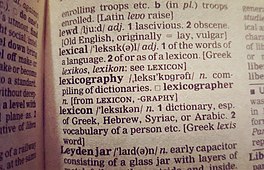Documentation:RelLex/Junior Dictionary for Central Koyukon Athabaskan – Dinaakkanaaga ts'inh huyoza
Junior Dictionary for Central Koyukon Athabaskan – Dinaakkanaaga ts'inh huyoza
| Relational Lexicography Knowledgebase | |
|---|---|

| |
| About RelLex | |
| An index of under-resourced North American language references, including print and digital dictionaries. | |
| Browse by | |
| About the Knowledgebase | |
| Find our filterable Knowledgebase of dictionaries and lexicography technology at https://knowledgebase.arts.ubc.ca/. | |
Language Name
Koyukon.
Alternate Language Names
Ten'a, Co-Youkon, Co-yukon.
Region
Alaska, United States.
Who
Eliza Jones (Author).
Others Involved
Organisations:
Alaska Native Language Center for the National Bilingual Materials Development Center in the Division for Rural Education Affairs of the University of Alaska (Publisher).
Individuals:
David Henry, Marie D. Hunter (Authors of Talking Pictionary); James Kari, Chad Thompson (Formatting, proofreading, and pronunciation contributors).
Publishing Information
Published 1978 by the National Bilingual Materials Development Center, Rural Education, University of Alaska, Alaska.
How People are Cited
People are cited in the Introduction of this dictionary.
How Information is Cited
The source of information for this dictionary is cited in the Introduction.
Where is Information Coming from
The information in this dictionary comes from work done by the author, her dictionary Dinaak'a Our Language, her own word lists, and words found in Talking Pictionary, developed by the Center, David Henry and Marie D. Hunter.
Tools and Framework used
This dictionary is available as a physical and digital book.
Access
The digital copy (PDF scan) is open access through the Alaska Native Language Archive. The physical copy can be accessed through libraries.
Included Languages and Directionality
English to Koyukon.
Dialects Included
This is a dictionary of the Central Koyukon Athabaskan dialect.
Type of Dictionary
This is a bilingual, mono-directional dictionary.
How are Entries Organised
The entries in this dictionary are organized alphabetically by English, while the Koyukon translation is provided underlined in the sub-entries. Every entry begins with a headword and includes sub-entries that integrate example phrases which further expand the different usages of the word.
It is noted in the Introduction that nouns are recorded in the unpossessed form unless they cannot be said without being possessed; further, as Koyukon verbs are quite intricate, only a small sample of the possible verbs are provided.
Other Features
| Feature | Included | More Information |
|---|---|---|
| Guide to use and understand | ❌ | However, there is a Pronunciation Guide to Koyukon Athabaskan for the reader to understand the difference in prounciaiton between Koyukon dialects and alphabet |
| Audio | ❌ | |
| Images | ✅ | Every page contains at least one illustration |
| Example phrases | ✅ | Included in the sub-entries |
| Speakers marked | ❌ | |
| Dialects marked | ❌ | This dictionary only includes one dialect |
Other Notes
The Introduction explains in more detail how nouns and verbs are used in Koyukon regarding pronouns, subjects, and tenses, which aren't individually mentioned in the entries.
The Alaska Native Language Archive includes a second document under the post for Junior Dictionary for Central Koyukon Athabaskan, which is a draft of the published dictionary. The draft does not include the Introduction nor the Pronunciation Guide, it is only the raw entries without the illustrations, but does include handwritten annotations and corrections by Eliza Jones.
External Links
Reference Junior Dictionary for Central Koyukon Athabaskan on WorldCat: https://www.worldcat.org/title/24555145
Open access digital copy of Junior Dictionary for Central Koyukon Athabaskan through the Alaska Native Language Archive: https://www.uaf.edu/anla/record.php?identifier=KO972J1978i